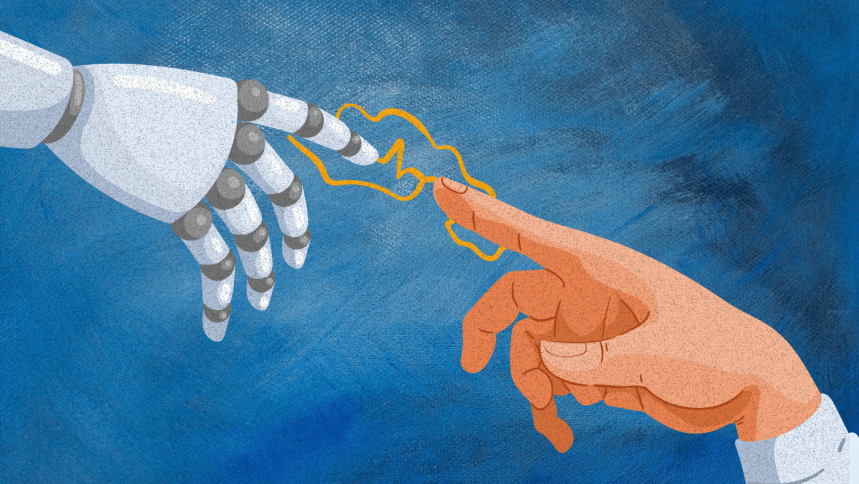The symbiotic future: How AI will reshape, not replace workforce in Bangladesh

The evolution of artificial intelligence (AI) has been one of the most defining narratives of our generation. Once the stuff of science fiction, AI has swiftly moved from labs and research papers into everyday life. From enabling virtual assistants to powering financial services and healthcare diagnostics, AI today is not just transforming how we work - it's redefining what work means.
We are standing at the threshold of an era where AI won't replace humans, but will work alongside us, unlocking new frontiers of productivity, creativity, and impact.
Change is not new—we've been here before
As AI reshapes industries globally, we see two dominant narratives emerging - one rooted in fear, and another in optimism. The fear is simple: AI will take our jobs. The optimism, however, sees AI as a force that will change the nature of work, augment human capabilities, and create new opportunities.
History offers a helpful perspective. From the industrial revolution to the rise of computers, fears of job displacement have always accompanied technological breakthroughs. Yet time and again, new technologies have given rise to new industries, redefined existing ones, and elevated the role of the human worker. The typewriter enabled the growth of administrative careers. The internet gave rise to the digital economy. AI will be no different.
AI might eliminate some repetitive, manual roles, but in doing so, it will pave the way for more meaningful, higher-value jobs. Roles that demand human creativity, empathy, critical thinking, and strategic judgment will not only endure but thrive.
Bangladesh's digital foundation is taking shape
While this unfolds not just nationally but also in the global context, there's no denying that AI can deliver a unique and beneficial value proposition for the world, particularly Bangladesh. The country is well-positioned to seize this moment. With over half of the households in the country having access to the internet, a digitally ambitious government, and a youthful population, the country is already laying the foundation for a thriving AI-powered economy.
From textile factories experimenting with automation to financial institutions leveraging data intelligence, key sectors are leaning into change. The expanding startup ecosystem, growing focus on digital literacy, and ongoing improvements in connectivity, signal a nation ready to integrate AI into its economic fabric.
Agents and automation
As digital adoption grows, so do customer expectations. Bangladeshi consumers increasingly expect personalisation, speed, and relevance in every interaction. For businesses, this means rethinking how customer service is delivered at scale and anticipating the future.
Organisations will be increasingly challenged in meeting these raised expectations. They will have to rapidly upskill teams to deliver personalised customer service on the go. Since expanding teams apace with the growing customer base might not make immediate business sense, maintaining the levels of personalisation will emerge as another challenge. The answer will lie in not just enabling employees with greater productivity, but also greater customer focus in every interaction—a multiplier effect that can only be achieved through technology.
Agentic productivity
AI agents are poised to drive exponential transformation for organisations, enhancing team capabilities, boosting productivity, and significantly elevating the quality of services delivered by employees.
Here is how AI agents can do this. Firstly, they will take away the repetitive tasks that do not require creative thinking, such as routine KYC during customer onboarding. Second, AI agents can serve as a source of standardised knowledge, vital in a job market where talent is highly mobile. And third, AI agents can enable teams to act assuredly in complex situations.
Further, as a completely digital tool, an AI agent leaves a traceable and accurate trail of its actions. Rigorous and regular audits of these footprints and the outcomes can continuously improve the AI agent, making it even more empowering.
Agents can also help highly trained experts do their work more easily. Agents' usefulness for diverse roles and situations is because they are easily customisable. You can create agents as per your needs, requirements and, crucially, your own guardrails.
Bringing AI closer to everyday work
As a region, South Asia is no stranger to resilience. Bangladesh, in particular, has shown time and again that it can rise to meet the future head-on. Now, imagine a textile worker leveraging AI to detect fabric inconsistencies, or AI agents like Salesforce's Agentforce providing round-the-clock support, swiftly resolving routine queries and enabling service representatives to focus on more complex, high-value interactions. Picture educators using AI agents to streamline operations, personalise learning journeys, and unlock new pathways for student success. This is not a distant vision, it's the near future of Bangladesh.
In such a future, AI elevates humans. And for Bangladesh, where the workforce is agile, ambitious, and adaptable, this represents a tremendous opportunity. To realise this vision, we must invest in our people. That means prioritising skilling, reskilling, and upskilling across sectors.
Education is deeply rooted in the cultural fabric of Bangladesh, and this foundation offers a powerful springboard for the future. By building on its strong academic ethos and expanding access to digital learning, Bangladesh is well-positioned to prepare its workforce for the jobs of the future. With focused investments in technical education and industry-aligned training, the country holds tremendous potential to lead in the digital economy.
Preparing for what's next
Ultimately, the conversation around AI is not about AI versus humans, it's about AI with humans. The real opportunity lies in building ecosystems that bring together technology, talent, and trust. And in that partnership lies the promise of progress. The ecosystem must cooperate to ensure responsible AI adoption, prioritising robust AI governance frameworks and safety measures. This could include establishing standards for data usage, auditing AI algorithms for fairness and bias, and ensuring that AI technologies align with our societal values and laws.
AI continues to evolve, the choice before us is clear - we can either view it as a threat, or we can embrace it as an opportunity to reimagine work, empower our people, and build a more inclusive economy.
Arundhati Bhattacharya is the President and CEO of Salesforce South Asia.

 For all latest news, follow The Daily Star's Google News channel.
For all latest news, follow The Daily Star's Google News channel. 








Comments